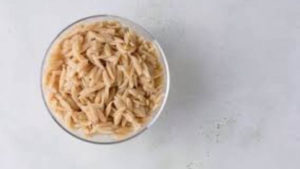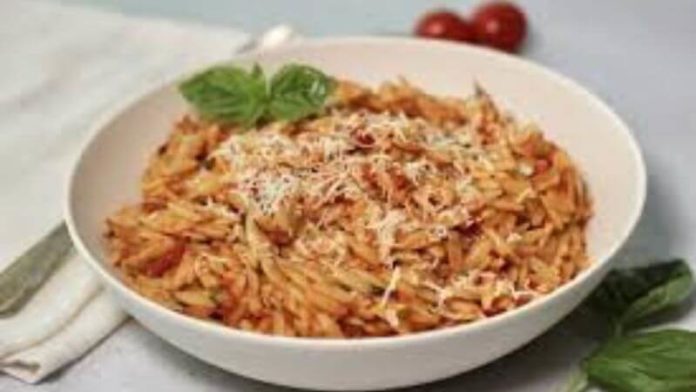Is there an orzo shortage? That’s the question on many people’s minds as this popular pasta alternative becomes increasingly difficult to find on store shelves. In this blog post, we’ll explore the current state of orzo availability and the factors behind the shortage. We’ll also discuss the health benefits and drawbacks of orzo, and share a fun fact about this versatile ingredient.
History Of Orzo
Orzo, the tiny pasta that often gets mistaken for rice, boasts a history that stretches across the Mediterranean and beyond. Though its exact origin story remains unclear, Italy is widely credited as the birthplace of orzo, with the word itself meaning “barley” in Italian. Despite the name, orzo is made from durum wheat, and its small, oblong shape has captured the hearts (and stomachs) of many cultures.
While still enjoyed in Italy, orzo truly shines in other cuisines. Greece has embraced orzo under the name kritharaki, incorporating it into dishes like the flavorful one-pot wonder giouvetsi, which features beef, spices, and a rich tomato sauce. Similarly, orzo finds a home in Spanish cuisine as piñones, the Spanish word for pine nut (though thankfully, they taste quite different!). The Middle East has its own traditions as well, often calling orzo “bird tongue” pasta due to its appearance, and using it in everything from soups to stews.
Interestingly, orzo even played a role in Israel’s history. During a period of austerity, the first Prime Minister, David Ben-Gurion, requested a wheat-based substitute for rice. The Osem food company rose to the challenge, and Orzo’s close cousin, Ptitim, was born. This roasted wheat flour pasta became a quick favorite, especially with children, proving orzo’s versatility can extend far beyond its original form.
Is There An Orzo Shortage?
No, there is a no orzo shortage reported in 2024, unlike some other pantry staples. However, general supply chain issues could still make it occasionally harder to find on shelves. If you can’t locate orzo at your usual store, check online retailers or try a substitute like pasta salad, macaroni or even couscous.

What Can I Use Instead Of Orzo?
There are many substitutes for orzo, depending on your dietary needs and the recipe you’re making. Here is a breakdown to assist you with picking:
- Similar Texture And Taste: For a close substitute in soups, salads, and casseroles, try couscous. It cooks quickly just like orzo and has a similar mild flavor. Another option is small-shaped rice like white or brown rice. These work well in hot dishes and absorb flavors nicely.
- Healthy Alternatives: If you’re looking for a more nutritious option, there are plenty of choices. Quinoa is a complete protein with a slightly nutty taste, perfect for salads and bowls. Brown rice and whole-wheat orzo (if available) are higher in fiber than white varieties.
- Gluten-Free Options: If you have celiac disease or a gluten sensitivity, there are several gluten-free substitutes. Look for pre-made gluten-free orzo made from alternative flours like corn or rice. Alternatively, use quinoa, brown rice, cauliflower rice, or small lentils.
- Heartier Options: For a chewier texture and more fiber, consider pearl barley, bulgur wheat, or green lentils. These work well in soups and stews, adding a heartier bite.
Related Article:
Is Orzo Good Or Bad for You?
Orzo is a type of pasta made from wheat flour, and it provides several health benefits. It is a good source of complex carbohydrates, which provide sustained energy and help support healthy digestion. Orzo also contains some protein, vitamins, and minerals, such as B vitamins, iron, and magnesium.
While orzo has health benefits, it also has some potential drawbacks. For those who are gluten intolerant or have celiac disease, orzo is not a suitable option, as it contains gluten. Additionally, orzo is relatively high in calories and carbohydrates, which may not be ideal for individuals following low-carb or calorie-restricted diets.
What Is A Fun Fact About Orzo?
Despite its rice-like appearance, orzo is actually a type of pasta originating in Italy. The word “orzo” means “barley” in Italian, which is a reference to its shape and size, resembling grains of barley. Interestingly, orzo is known by different names in various regions, such as “risoni” in Italy and “kritharaki” in Greece.
What Is The Deal With Orzo?
Orzo, that delightful, rice-shaped pasta, has found a place in the hearts of many food enthusiasts. Its versatile nature allows it to be used in soups, salads, and even as a substitute for rice. However, recent events have sparked conversations about a possible orzo shortage.
The whispers began when shoppers started noticing a lack of orzo on supermarket shelves. Some speculated that it may be due to increased demand during the COVID-19 pandemic, while others pointed to supply chain issues. As of now, it appears that the shortage is not widespread or long-term, but rather a temporary hiccup in the supply chain. However, the situation is fluid, and it’s worth keeping an eye on for any pasta lovers out there.
What Country Is Orzo From?
Orzo, despite its rice-like appearance, hails from Italy. Known as ‘risoni’ in its home country, orzo means ‘barley’ in Italian, a nod to its grain-like shape. Although it’s a staple in Italian cuisine, orzo has been embraced by many cultures worldwide. This global appreciation for orzo makes any potential shortage a concern for food lovers from all corners of the globe.
Is Orzo Better Than Rice?
The orzo versus rice debate is a topic of heated discussion among food enthusiasts. Orzo, with its pasta lineage, tends to be more robust and chewy, offering a satisfying texture. It also absorbs flavors beautifully, making it a perfect base for a variety of dishes.
On the other hand, rice, with its light and fluffy texture, is a staple food for more than half of the world’s population. The versatility of rice, from sushi to paella, is truly impressive. However, it can be argued that orzo provides a unique twist to the usual grain-based dishes.
In the end, the choice between orzo and rice boils down to personal preference. Both have their unique charms and culinary uses. However, if you’re an orzo enthusiast, the possibility of a shortage might make you appreciate this humble pasta even more.
Conclusion
While it’s unclear how long the orzo shortage will last, it’s important to remember that such situations are often temporary. In the meantime, those who enjoy orzo for its versatility and health benefits can explore alternative pasta options, such as whole wheat pasta or gluten-free varieties, depending on individual dietary needs.
As for the fun fact, it’s always interesting to learn about the origins and history of the foods we enjoy, and orzo is no exception. So, the next time you enjoy a delicious dish featuring orzo, remember that you’re partaking in a culinary tradition with roots in Italy and beyond.

